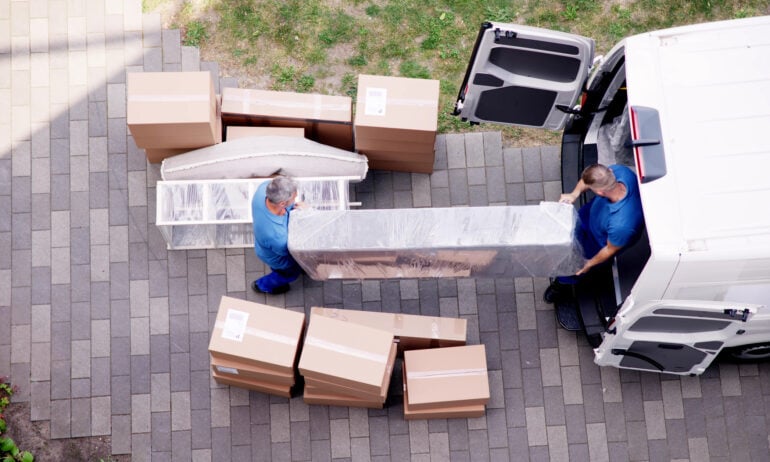A Moving Checklist for 2025
Here are all the things to think about when you're planning a move.

Some or all of the mortgage lenders featured on our site are advertising partners of NerdWallet, but this does not influence our evaluations, lender star ratings or the order in which lenders are listed on the page. Our opinions are our own. Here is a list of our partners.
You are ready to start your move, but don’t know where to start. Here are all the important things to remember to do before, during and after your next move.
As soon as you find a new place
☐ Hire the movers. Contact at least three moving companies for quotes. Avoid surprises later by understanding whether the pricing is based on estimated weight or estimated hours. Check out our list of the best full-service movers to get started.
☐ Schedule a walkthrough. Reputable movers will want to do a virtual or in-person walkthrough of your home and property to provide you a reliable quote. To make sure you get an accurate quote, do these things during the walkthrough:
Point out the things that won’t be coming on the move.
Point out antiques, heirlooms, art, pianos and similar items that need special care or special packaging.
Ask the movers what they won’t move (candles, cleaning products and your grill's propane tank are often on the no-go list for movers, for example).
Flag items of special value that might require additional insurance from the movers. Make sure to declare, in writing, any items valued over $100 per pound.
☐ Take a video of your home contents before you start packing. This will help you notice if anything doesn’t show up later or is damaged in the move.
☐ Start gathering moving supplies. If you're not having the moving company pack your stuff, get moving boxes, tape, bubble wrap, old newspapers or wrapping paper, and markers. Look for ways to get cheap or free moving boxes to save money on your move.
☐ Find or get appraisals of your antiques and high-value items. An appraisal is your proof of value if the movers lose or damage the item. This can take weeks, but it’s important for proving an item's value if it's lost or broken during the move.
☐ Sort and declutter. Because moving expenses often come down to weight and volume, reducing how much you move can save you money. Touch every single thing you own, including every item in your storage bins, storage areas such as the basement or garage, and your paper files. Clean out your storage unit. Decide if each item needs to stay or go.

Right after you hire the movers
☐ If you rent, give notice to your landlord. Check your lease to confirm, but the rule for giving notice that you won’t renew your lease is typically 30-90 days.
☐ If you rent, tell the landlord what day the movers are coming. The landlord may require advance notice to use the service elevator, loading dock or certain stairwells. The landlord might also require the movers to provide proof of insurance or other documents ahead of time.
☐ Request time off from work to move. You need at least the day the movers load and the day the movers unload.
☐ Tell the HOA what day the movers are coming. Find out if you need a permit from the city or the homeowners association in order for the movers to park on the street while they load and unload. Do this for the location you’re leaving and the location you’re moving to.
☐ Organize your records. Get all your important financial, legal and medical records in one place, including birth certificates, passports and licenses. You'll probably want to keep these with you rather than having the movers load them in the truck.
☐ Plan for unmovable items. Figure out what to do about the stuff the movers said they won’t move. These are things you may want to keep, so figure out alternative shipping methods now. This includes for your car or other items like boats that you might need to move with you.
☐ Set a cut-off or transfer date for utilities and other household services. And follow up by setting up new services for the ones you can’t transfer. If you need help remembering who to tell, look at your checking account or credit card statement to see who you’ve been paying. Here are some common things to cut off when moving:
☐ Check your insurance coverage and buy more if needed. Find out if your existing homeowner or renter insurance policy covers your stuff while it’s in transit or in storage and what the mover's responsibilities are for damages that may occur to your belongings. Buy more insurance now if you think your stuff isn’t protected from damage or theft while in transit or storage.
6 weeks before move day
☐ If you rent, schedule a walkthrough on your old place. Get this on the calendar with your landlord now. You will probably need to do this right after moving day in order to get your deposit back.
☐ Schedule a walkthrough on your new place. Get this on the calendar with your agent or landlord now. This gives you a chance to note any pre-existing damage or flag any issues with the closing.
☐ Schedule installs for utilities, cable, internet, security systems or other equipment-based services at the new place. These people get booked up; don’t procrastinate or you might not have internet for a while in your new place.
☐ Book the painters, electricians or other home services you need right away when you move in. It may be a lot easier to have this work done while everything is still in boxes or before your stuff arrives.
2 weeks before move day
☐ Call the movers to confirm everything. If they somehow lost your booking, better to find out now while you may still have some time to rebook them or find another moving company.
☐ Schedule cleaning and repair work on your old place. If you’re renting, your lease should detail how you need to clean it in order to get your deposit back. Schedule cleaners now if you know you won’t have the time or energy after the move. Fill holes and cracks with spackle, and touch-up scuff marks.
☐ Figure out how your final trash and recycling pickup will work. See if your neighbors or landlord can put the bins back after they’re picked up.
☐ Get cash to tip the movers. If you plan on tipping your movers, better to get the cash now before you run out of time handling last-minute details.
☐ Figure out what to do with pets, friends and kids on loading and unloading day. Either put them to work or send them away for the day.
☐ Drop off or schedule pickups of charitable donations. If there are things in good shape that aren’t worth the expense of moving, aren’t needed or that you couldn’t sell, schedule a charity pickup. Schedule a junk removal company to come get items to toss. Some moving companies will handle this for you for an extra fee.
☐ Use up your food stores. Movers usually don’t move perishable items. Start eating everything in the freezer and the pantry. Defrost the freezer if you’re moving the fridge.
☐ Photograph complex tech setups. This will help you remember how to reconstruct everything on the other end.
☐ Have your mail forwarded. You can do this on the U.S. Postal Service website. Typically the USPS will forward mail for one year but magazines for only 60 days.
☐ Pack a “go box” of items that stay with you when everything else goes on the moving truck. These are things to get you by between move-out day and move-in day.
Toilet paper.
Paper towels.
Cleaning products.
Set of sheets and towels.
Some dishes and utensils.
Chargers.
Flashlights.
Water.
Scissors, screwdrivers and a hammer.
Garbage bags.
Pet food, leashes, toys, beds and medicines.
Passports.
Credit/debit cards, and your checkbook if you have one.
Important papers.
Each person in the household should also have a suitcase that has essential and irreplaceable items that they don’t want the movers to touch: medications, a change of clothes, special jewelry or trinkets, important documents, computers, etc.
on moveBuddha's website
on moveBuddha's website
on moveBuddha's website
The day before moving day
☐ Get the payment for the movers ready. If the movers are making you pay with a check, make sure you have your checkbook or that you take time to go to the bank to get the payment ready.
☐ Transfer your prescriptions to a new pharmacy. Make sure the auto-refill is turned off at your old pharmacy and turned on at the new one if you’re moving out of the area.
☐ Drain the gas out of garage equipment you’re bringing, such as the lawnmower.
☐ Empty the appliances. Empty the dishwasher, the washing machine and the dryer.
☐ Retrieve the hidden keys. If you hide a spare house key somewhere on your property, find it.
On moving day
☐ Direct the action. Be present. Supervise. Communicate. Answer questions and stay until the job is done.
☐ Do a final walkthrough. Once the crew tells you the truck is loaded, walk through every single room of the house one more time. Look in every closet, cabinet and drawer for forgotten items. Look in the washing machine, dryer, dishwasher, refrigerator and oven. Remember to look on high shelves and in the mailbox. Check for damage the movers caused. Walk all the way around the front yard, back yard and side yard. Close all the windows, turn off the lights and lock the doors. Adjust the air conditioning or heat to a comfortable temperature that won’t have it running all day.
☐ Get the bill of lading. This is the official inventory list from the movers. Make sure to declare, in writing, any items valued over $100 per pound. Note missing or damaged items on the inventory list before you sign any documents. Look for the high-value inventory form, which indicates whether items of extraordinary value are in the shipment.
☐ Give the movers the exact destination address again and how to contact you. Ask if they need directions on how to get to the new place and provide them, if needed. Give them your cell phone number, and get their contact information if they’ll give it to you.
☐ Change/delete codes on the alarm system if it’s staying with your old place.
☐ If you rent, return the keys. Take these to the landlord after you leave for the last time.
☐ If you rent, pick up the keys to the new place. Make sure you get the mail key and keys to additional dwelling units, the building’s gym, extra garages or storage areas.
On unloading day
☐ Review or sign the final paperwork, which will likely contain:
A high-value inventory form, which indicates that your items of extraordinary value arrived in the shipment.
A bill of lading/freight bill, which includes the terms and conditions under which your goods were moved and is also your receipt for the shipment.
☐ Tip the movers. This crew may not be the same crew that loaded you in your old location if it’s a farther move. If it is the same crew and you’ve already tipped them, you don’t need to tip them again.
After you’re unpacked
☐ Change the locks. You don’t know who else has the keys. Make copies of your new house keys for your babysitter, dog walker or other trusted visitors.
☐ Watch that video of your home contents. Did anything not show up?
☐ Change your address with everyone you know or do business with.
Money-related: Work, bank, investment accounts, HSA or FSA accounts, car insurance, life insurance, renters insurance, pet insurance, other insurance policies, credit card issuers, your accountant, your investment advisor, the Social Security Administration, the Veterans Administration and Medicare.
Kids-related: School, tutors, lesson providers, babysitters, daycare, sports teams and coaches.
Medical-related: health insurance, dental insurance, vision insurance, kids doctors, parent doctors, dentists, therapists, cord-blood storage, prescription deliveries and the veterinarian.
Legal-related: Your lawyer, voter registration, state and local tax authorities if you are self-employed and the city/county property tax assessor.
Life-related: Amazon, delivery apps, ride apps, family location-tracking apps, newspapers, magazines, streaming services or cable, your internet provider, the neighbors, your alma maters and alumni organizations, charities, the pet microchip company, airline frequent flier accounts and hotel rewards accounts.
Family-related: If you send out holiday cards, announce your move on it.
☐ Claim your property tax exemptions. Some counties provide homestead exemptions that can significantly reduce your property tax bill – but you have to file the paperwork to claim them. If you purchased a house, you’ll likely want to file for a property-tax exemption once you get unpacked.
☐ If you rent, check on the ETA of your security deposit. The deadline should be in your lease, but sometimes landlords need reminding.
on moveBuddha's website
on moveBuddha's website
on moveBuddha's website
If you’re planning a long-distance move
Right after you hire the movers
☐ Find a temporary place to live if there’s a gap between when you move out and when you move in.
☐ Book flights, hotels and/or rental cars for the trip to the new place. Plan your route and your activities along the way. Make sure you have a ride to and from the airport if you’re flying.
6 weeks before move day
☐ Get a tune-up on your car. Make sure it’s up for the long drive if you’re not having it shipped.
2 weeks before move day
☐ Clean out your safe-deposit box. And close the account so you don’t keep paying for it.
☐ Return borrowed items, like library books. Look for items that you’ve borrowed from friends and family as well.
☐ Pick up your dry cleaning. Be sure to cancel the account if you pay for pickup or delivery options.
☐ Clean out your locker at the gym. Fill out paperwork to cancel your membership while you’re there.
☐ Consider changing your bank. If you can’t keep your current bank, go ahead and research which bank you want to use instead. Go ahead and set up an account if you can.
On moving day
☐ Tip the movers. If the crew that’s packing your truck isn’t the same crew that will unload it at your new place out-of-state, consider tipping today’s movers as well.
After you’ve unpacked
☐ Get a new driver’s license. You may only have 30 days to do this.
☐ Register the car. You may only have 30 days to do this. See if you need an emissions test.
☐ Establish the pets with a vet. By already having them established, you’ll likely be able to get an appointment more quickly when they need care.
☐ Get a new pet license from the city. This can help local shelters reunite you with your pet if something happens.
☐ Get a new alarm license from the city. This is often required in order to receive a response from law enforcement if your home security alarm goes off; it can also help avoid false-alarm fines from the city.
☐ Get a new safe deposit box. A safe deposit box can protect your most precious items and records from fires, theft and floods.
☐ Update your estate planning documents. Different states have different rules about how wills, health directives, trusts, powers of attorney and other estate planning documents have to be worded and filed. You may need to get an estate attorney to redo some of your documents so they're valid in your new home state.
If you have kids
Right after you hire the movers
☐ Register the kids for school. Don’t assume they can go to any school in town, or that they can go to the school closest to your new place, or that school bus transportation is available from your new place to the school. School districts have different rules about catchment areas and attendance, and there will be paperwork, transcripts and immunization records to manage.
☐ Register the kids for daycare or after-school activities. If you’re going to need somewhere for the kids to go, get a headstart on registering them before you move.
6 weeks before move day
☐ Figure out what you need to baby-proof the new place. Order any new items now to pack in your suitcase that you take with you. This way you can baby-proof your new place as soon as you move.
☐ Schedule goodbyes and last play dates. Give your kids a chance to say goodbye to family, friends, neighbors and caregivers.
☐ Identify which toys or comforting items the kids need for the move. These might be things to help them handle the chaos and anxiety or items to entertain them if there’s long-distance travel.
☐ Enroll kids in tutoring to avoid gaps in educational support. If your kids are currently tutored to support their learning, go ahead and research tutoring options and set up tutoring to start at the same time your kids start at their new school.
If someone in your family identifies as transgender or non-binary and you’re moving to a new state
Updating your driver's license
☐ Research what documentation you need to update your driver’s license. States differ in what they require to replace a valid out-of-state driver’s license. For example, Texas requires you to provide an original or certified copy of your birth certificate or an unexpired passport; however, the state says a passport is not guaranteed to work on its own. If the gender marker on one of these doesn’t match the other, or the gender marker you are requesting on your driver’s license, it’s likely to cause issues.
☐ If you have a non-binary gender marker on your current license (“X”), research if your new state allows the same marker. Not all states allow the non-binary “X” marker on state documentation, such as driver's licenses. So if you have an “X” gender marker on your current state’s IDs, moving to a state that doesn’t allow your gender marker will mean you have to change this information on your IDs in your new state.
Changing your name
☐ Check if your new state requires you to publish your name change if you plan on doing so after you move. Some states require that individuals publish their name change request in circulars such as local newspapers. If you plan to change your name soon, check if your new state has this requirement. If so, you might have to pay to publish the announcement. Because the information will be publicly available, this could create an issue if you aren’t planning to be open about your transition. If that’s the case, consider changing your name before moving if your current state doesn’t require you to publish a name change announcement.
Receiving gender-affirming care
☐ If your insurance is going to change, verify with your new employer that there are no coverage exclusions that will affect you or your family. Some states exclude gender-affirming benefits in their medical insurance plans for state employees or through programs that pay for healthcare with public funds.
☐ Verify if the new state allows gender-affirming care for minors if you have a child that needs it. Some states have passed bills that prohibit medical professionals from providing gender-affirming care or gender transition procedures to patients under 18 years of age, even with parental consent.
Enrolling your transgender or non-binary kids in school
Check if your child will be affected by state laws that:
☐ Require kids to play on sports teams as the sex they were assigned at birth. West Virginia, for example, has passed laws that prohibit minors from playing on sports teams that don’t align with the sex they were assigned at birth in schools and institutions that receive state funding.
☐ Require kids to use restrooms that are designated for the sex they were assigned at birth. Some states have laws that require kids to use school restrooms that are designated for the sex they were assigned at birth.
☐ Prohibit educators from supporting social transitioning in schools. For example, Texas prohibits school employees from providing students under the age of 18 with information or guidance about socially transitioning. Some policies vary by school district, such as a Texas school district’s policy that doesn’t require teachers to use a student’s preferred pronouns, so you’ll want to research specific districts before committing to one.
Table of Contents















